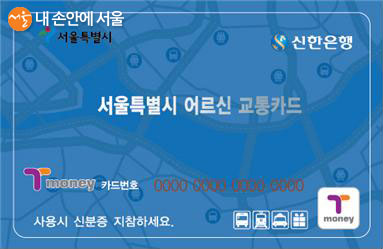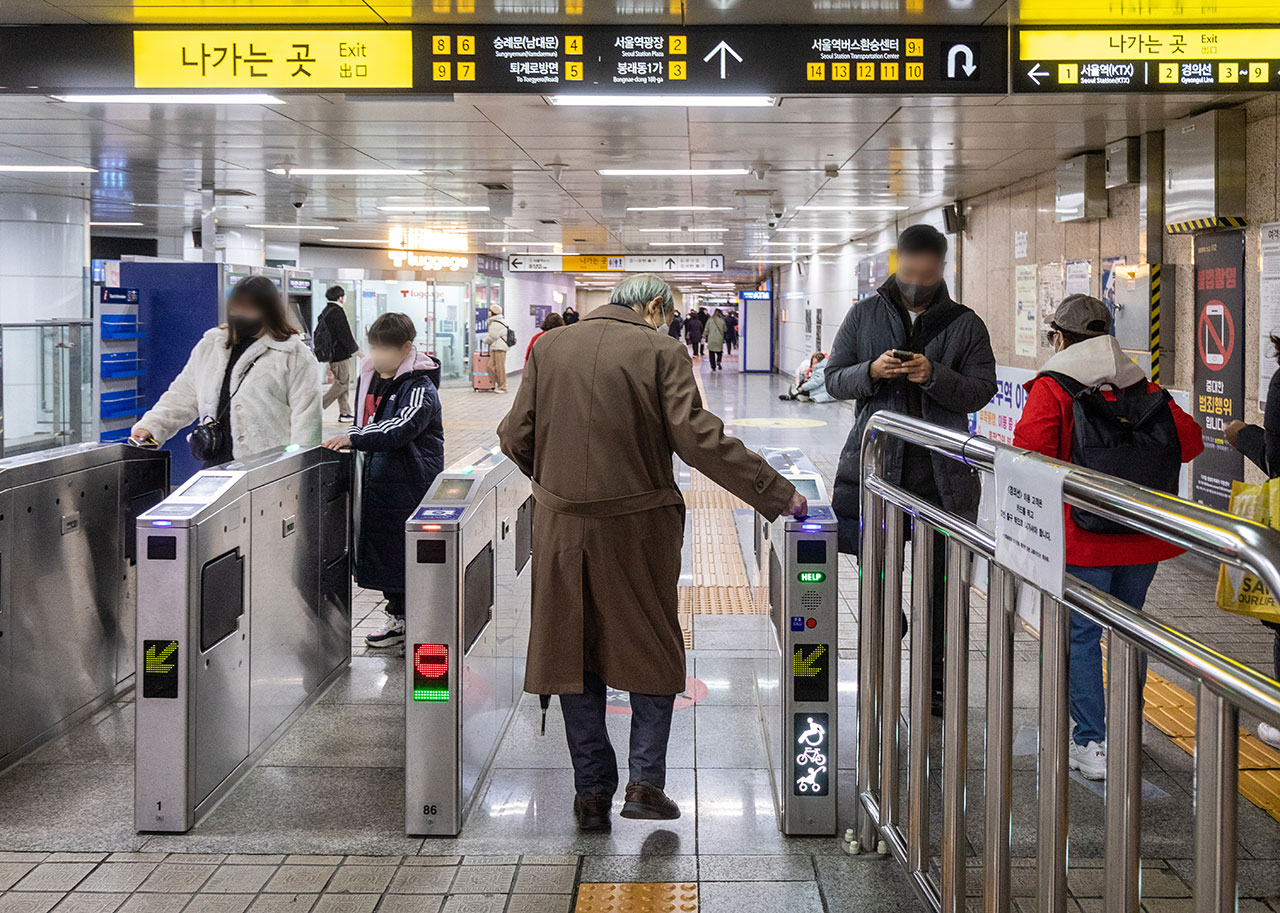Free subway fares for the elderly is being touted as one of the main causes of the current subway operations deficit and there are calls for it to be abolished. Transportation income decreased significantly due to the COVID-19 crisis in 2020 and as a result, Seoul Metro recorded a loss of 1.1137 trillion won. This was the largest deficit it ever recorded, doubling its annual debt from 2019 (586.5 billion won). The Seoul Metropolitan Government is estimated to have posted an overall deficit of 630 billion won in 2021. In the face of ongoing deficits, the city has proposed increasing subway fares and abolishing the free fare systems for seniors. However, I strongly oppose the abolition of the free fare system for senior citizens. Seniors’ economic and social well-being are at stake, and alternative solutions are available.
 |
| ▲ T-money Card for Senior Citizens (Photo from Seoul Metropolitan Government website) |
First, the economic welfare of the elderly must be guaranteed. Korea's national poverty rate for people aged 65 and over is ranked first among Organization for Economic Cooperation and Development (OECD) nations. Based on OECD data, Korea's poverty rate for seniors was 49.6 percent, four times higher than the OECD average of 12.4 percent. The senior poverty rate in other countries was 21.5 percent in the United States, 19.4 percent in Japan, and 9.4 percent in Germany. Korea’s rate was overwhelmingly higher than other countries. The poverty rate is not only high but there are also no signs of it falling any time soon. In fact, the country recorded a 1.6 percent rise in senior rates of poverty in 2020. In most cases, the elderly do not have their own vehicles due to financial constraints and rely on the subway more often than other riders. Abolishing the free subway system would put a financial burden on the elderly, who already struggle with managing their fixed and limited income. A simple subway fare can be a huge burden for those in need. In addition, the free fares program is not just about free transportation. It means much more to the elderly. For example, Silver Delivery is an income support program for elders who do not have any savings. It is a package delivery service that employs senior citizens to deliver packages via the subway. With the support of the Ministry of Health and Welfare and the competent district for senior citizens in each local government, the subway delivery business group is a senior job project aimed at revitalizing the employment of the elderly. In addition to each local government employment opportunity, private companies that focus on hiring seniors who can travel free on subways are also on the rise. These jobs are popular because they provide supplemental income opportunities and improved health to those that take part. If the free fares system is abolished, job creation projects that rely on it will also be eliminated, causing a serious shock to levels of elderly unemployment.
The next reason the free fares system should not be eliminated is for the social welfare of the elderly. The elderly can access economic activities through the free subway system, which helps address social isolation. Recently, the Health and Welfare Counseling Center released data regarding suicide rates among the elderly. The average suicide rate in the OECD countries was 17.2 percent, but in Korea, that number jumped to 46.6 percent, 2.7 times higher than the OECD average. The Civil Service's budget to prevent elder suicides is insufficient. According to 2023 health and welfare budget data, welfare programs for senior citizens increased by 11.3 percent compared to last year's supplementary budget; however, this is still much lower than the funds of the past three years. The government's decision to reduce the budget for policies related to welfare for the elderly has sparked criticism, with many pointing out that the welfare budget for the elderly is the lowest it has been in three years. This has led to doubts over the feasibility of implementing new welfare policies. According to the paper published by the Korea Transportation Research Institute, "An Analysis of Welfare Policy Effects in the Transportation Sector - Focusing on Free Fare on Subway Routes," the implementation cost of the free fares for the elderly program is close to zero. Free fares for the elderly is considered a high-efficiency transportation welfare policy. Furthermore, the abolition of the free fares will have an impact on the activity level of seniors, which could also result in detrimental psychological/physical side effects that will impact other social costs in the long run. In other words, the proposed abolition will definitely have far-reaching negative consequences.
 |
| ▲ Senior Using the Free Fare System (Photo from Newspost) |
An alternative would be to create a needs-based system. This means the government could identify individuals who could benefit depending on the time of usage and their financial status. For those eligible under this new program, free fares would apply most of the day, with the exception of rush hour, when ridership exceeds 120 percent. In this case seniors would be charged a half or full fare. Outside of rush hours, the free fare system would continue to be applied as normal. To determine who could qualify, the government could introduce and income based approach. Currently, Korea's free fare system allows free rides for seniors regardless of their level of income. This is not in sync with a policy of assisting elderly people with low to no income. The free fare system for seniors should only be provided to those below a specific level of income.
Next, if determining fees based on ridership hours or income levels seems too ambiguous, then limiting the number of rides a user takes could be another solution. Currently, seniors are entitled to unlimited free fares, so if there is a deficit due to the free fare system, there is a potential for that deficit to be unlimited. Therefore, seniors can guarantee their right to move for free, by limiting the number of times they can take advantage of it.
The elderly population in South Korea has played a significant role in building the country into what it is today. However, as the aging population is accelerating, it is necessary to consider various measures to maintain free fares for the elderly while containing the growing operational deficits. It is essential to approach this matter collaboratively, without viewing the elderly as a problem for local governments. Rather, we should consider a wide range of creative measures that address budgetary concerns while maintaining the free-ride system for the elderly. With this in mind, I oppose the abolition of the free-ride system for the elderly and suggest alternatives be considered in its place.
황인경 dankookherald@gmail.com

 Vote for the Campus Brand Naming!
Vote for the Campus Brand Naming!

![[Campus Magnifier] Let's Surf the Library!](/news/thumbnail/202404/12496_1765_4143_v150.jpg)




